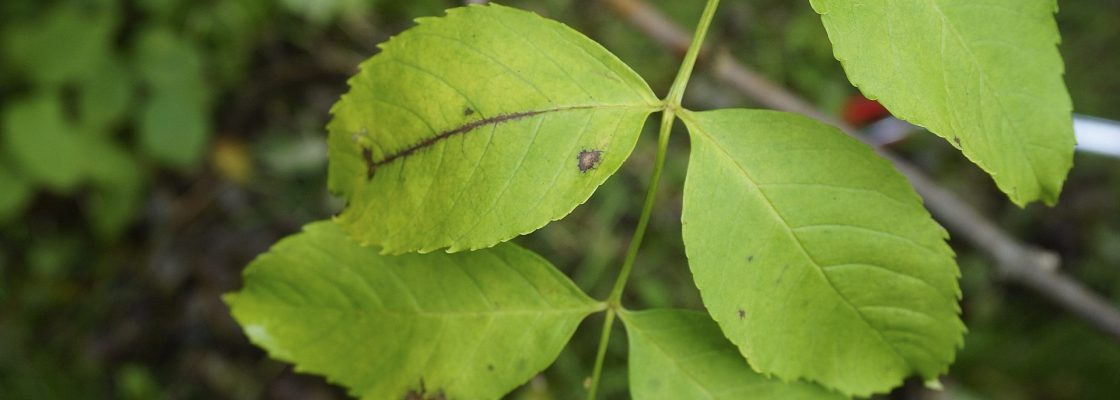Summary
Living Ash Project phase I
The specific objectives of Forest Research in the Living Ash Project are to establish new genetic trials to whether, and to what extent, tolerance of ash trees to damage caused by ash dieback is governed by genetics. The genetic trials will enable us to understand how much responses vary among families, whether breeding trees will incur a cost for tree growth and form and explore whether and how this changes over time.
Results from the trials will help determine the scope for breeding as a solution to the ash dieback problem.
The trees used for these genetic trials were raised from seed collected from improved ash seed orchards, so are related to those already planted under the existing ash breeding programme. Forest Research are also developing tissue culture techniques to enable us to rapidly produce large numbers of any tolerant trees identified, for use in future reforestation.
A final strand of this project, which is run by the Future Trees Trust, will use citizen science to screen the wider ash population in native and planted woodlands, streets and hedgerows. The objective is to produce trees that show good tolerance to the fungus, and plant them on the public forest estate as an archive which can then be made available to the forest industry.
This project entered its second phase in 2019 with additional financial support from DEFRA.
Living Ash Project phase II (LAP2)
The objectives of LAP2 are to:
- Establish a National Archive of Tolerant Ash based on selections made in the Living Ash Project phase I and from Forest Research’s mass screening trials (Future Trees Trust)
- Intensively screen selected trees using chemical and controlled inoculation approaches (FERA, Forest Research).
- Maintain and monitor ash dieback mass screening trials and progeny trials to enable a final assessment and a second round of selections of tolerant trees in 2024 (Forest Research).
- Develop vegetative propagation techniques (Kew)
LAP2 is funded by DEFRA and runs from 2019-2024.
Research Objectives
Establish new progeny trials:
- Plant around 40,000 ash seedlings in half-sibling progeny trials over three sites in the British Isles where ash dieback is already known to occur;
- Monitor the trials for genetic control of tolerance to the disease;
- Select tolerant trees;
- Determine the heritability for tolerance, growth and form as well as the genetic correlation between traits and across sites
- Determine the likelihood of forming a breeding population with tolerant trees.
Tissue Culture techniques:
- Develop reliable techniques for the mass production of selected ash tree using tissue culture techniques;
- Develop methods of long-term storage of ash tissue in liquid nitrogen (cryo-storage).
Findings and Recommendations
- Heritability for dieback tolerance was moderate to high across the three sites (h2 = 0.41); moderate for height growth (h2 = 0.20) and low for form (h2 = 0.14)
- Early results suggest there is no trade-off between tolerance and growth or tree form which means that breeding for tolerance of ash dieback will not mean we have to put up with poorer trees for other purposes.
- Proliferating ash shoot cultures can be readily established from mature seeds.
- Shoot pieces from these can be rooted with relative efficiency (70-90%) depending on the clone, and then survive transfer to normal growth in a nursery (>70% survival), within a few weeks of being weaned off.
- These procedures have been verified for a broad range of the UKs population of ash trees.
- While it is also possible to establish shoot cultures from extant trees, such as may have been identified to be possibly resistant to ash die-back disease for instance, this is much more difficult and is not yet routinely possible, but this is still being worked on.
Latest Update
- Half-sibling seed were collected from 50 unrelated trees in a breeding seedling orchard in Oxfordshire which belongs to Earth Trust
- Following stratification seed was sown in spring 2015
- Three trials with 46 half-sib progenies were successfully established in spring 2016
- An investigation into Tissue culture techniques is in process of adjusting using a general mixed collection of seed from the Earth Trust breeding seedling orchard
- The programme started in August 2013; and the first phase ended in March 2019. The second phase of the project runs from 2020 – 2025.
- After three years of growth trials were assessed for dieback infection, growth and form.
Our Involvement
Forest Research leads two work packages in the Living Ash Project phase II.
In work package 1, we will maintain and monitor the mass screening trials and progeny trials established under earlier projects. Following a reassessment of all sites in 2024, we will select outstanding trees and replicate these by grafting for inclusion within the National Archive of Tolerant Ash.
In work package 4 we will perform intensive controlled inoculation trials to screen selected trees to verify levels of tolerance, using two methods:
- Ascospores will be harvested from fruiting bodies and inoculated on to ash leaves
- Small cubes of sterile ash wood will be inoculated with the fungus and taped to the main stem of the ash tree following the creation of a small wound. The infected trees will be monitored for several months and any resulting infections recorded.

